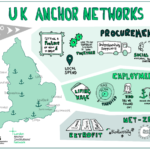
This update is part of a regular series of rundowns of policy developments and reports on our work in Scotland, by CLES Senior Researcher and Scotland lead, Naomi Mason.
Looking back, looking forwards and taking stock
As I near my one-year anniversary of joining CLES as our lead for Scotland, I’ve been looking back at what has happened over the last 12 months. It has been quite a year, with political turbulence in Holyrood, Westminster and across the world, not to mention the continued global instability in our climate and economies. So – as the Scottish Budget was announced last week – I couldn’t help but reflect on both how interlinked we all are and how our local economies are profoundly impacted by global change.
“power and politics are fundamental to change”
I’m reminded that, by building flexibility, community wealth building makes our places stronger and more resilient to the fluctuations of wider economic systems. But this takes time, effort and persistence. It also takes political will and power. I’ve previously written about the opportunity that the forthcoming community wealth building legislation could bring to Scotland, and the many forms of power which our rural communities can tap into, or struggle against, so I won’t labour the points here. Suffice to say, power and politics are fundamental to change.
“bringing power from Holyrood down to our local places”
What we don’t talk about often enough, however, is the relinquishing of power. When we talk about devolution, transferring power away from Westminster to the nations or regions of the UK, we often focus on that first step away from the centre. What we talk less about is the stages beyond. Often, bringing power from Holyrood down to our local places seems to be a step too far here in Scotland. There were high hopes for this to happen over the last 25 years of the Scottish parliament, but how well it has truly benefited Scotland’s local democracy is not clear, a point which was beautifully articulated by Bill Howat in an article published last week. And there is a further question: even if power had reached our councils to a greater degree…what then? Are they even the best mechanism for delivering local democracy and decision making? Opinions differ. According to the results of a Democracy Matters consultation earlier this year, the answer is no: there is an appetite for more community-led decision making and power.

















